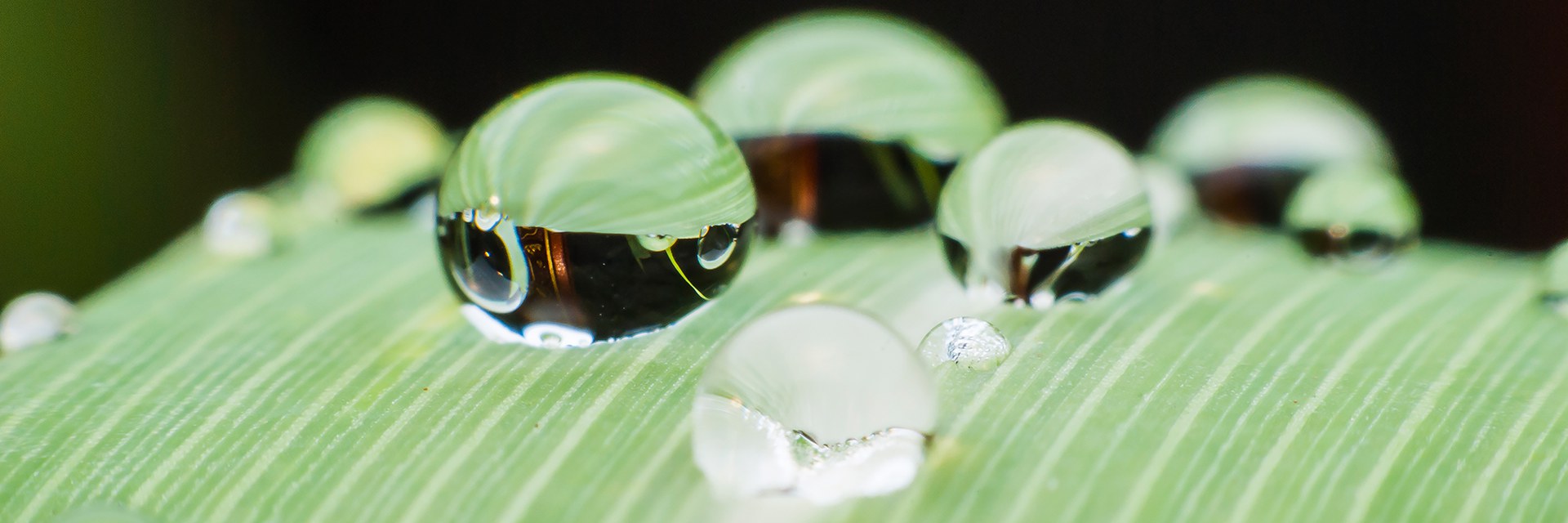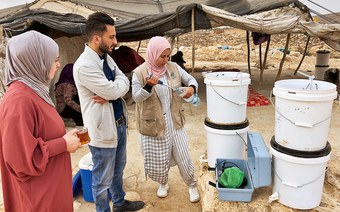
Projects
Projects of the Institute for Ecopreneurship.
All Projects in alphabetical order
-
500°C and potassium Methods
Sewage sludge produced during waste water purification contains not only biomass and pollutants but also precipitated phosphorus. By law, starting in 2026 this important component of fertilisers must be recovered, making Switzerland less dependent on phosphorus imports. In this context, HLS researchers are using pyrolysis to turn sewage sludge directly into fertiliser. This oxygen-free thermal process produces high-quality fertilisers, can easily be integrated into existing sewage treatment plants and will shortly begin a pilot phase.
-
A water filter for emergencies
Clean drinking water is a luxury. In many parts of the world water is polluted and full of harmful bacteria; the problem is particularly acute during humanitarian crises, such as in refugee camps. A simple short-term solution is a domestic water filter. There are many different types on the market, but their quality varies widely, so HLS researchers tested filters in three disaster areas. Working with the local population, they have made suggestions for product improvements.
-
ABIScreen: Use of bioassays for the assessment of industrial wastewaters
Bioassays are an important complement to toxicity detection in industrial wastewater
-
Accompanying the monitoring of the ozone test procedure with bioassays
-
ACTIWATE
ACTIWATE - Advanced concentrate treatment for integrated membrane based water reuse systems.
-
Agriloop
Pushing the frontier of circular agriculture by converting residues into novel economic, social and environmental opportunities
-
Agrocomposit
Biochar-compost composites for supporting site-specific soil agro-ecosystem functions and climate change mitigation
-
Aktifilt
Entfernung von Mikroverunreinigungen mit Adsorption und Tiefenfiltration
-
AquaNES
Demonstrating synergies in combined natural and engineered processes for water treatment systems.
-
Bacterial super-resistance decoded
Scientists and politicians agree: antibiotic-resistant bacteria are a major challenge for medicine, both now and in the future. The World Health Organization estimates that by 2050 more people will die as a result of infection by multi-resistant bacteria than from cancer. A team of researchers at the HLS have shed light on a particularly alarming mechanism by which bacteria not only survive antibiotics but even use them as nutrition.
-
BioPhosRec
Recycled phosphorous-enriched fertilizer
-
Business models for the Safe Reuse of Treated Wastewater in India
Support to Ganga Rejuvenation/India-EU Water Partnership Action; Consultancy on the Safe Reuse of Treated Water (SRTW) in India focusing on SRTW business model recommendations and the development of a SRTW Compendium considering approaches of the European Union.
-
Demoware
Innovation and Demonstration for a Competitive and Innovative European Water Reuse Sector
-
eDNA detection of aquatic diseases based on DNA fragments in environmental samples
-
Effects of pesticides and other environmental chemicals on the behavior and gene expression of gammarids
-
Effects of pesticides on the microbiological community in soils of agroecosystems
-
Effects of plant protection products on honey bees
-
Electra
Electricity driven low energy and chemical input technology for accelerated bioremediation.
-
Evaluating household water filters in emergencies
Our project evaluates 420 filters of five manufacturers in three different humanitarian contexts in Palestine, Somalia and Kenya.
-
Gravit`eau handwashing water recycling systems
Handwashing system recycling water for emergencies.
-
Gravit`eau Water Kiosks in Uganda
Decentralized water treatment in schools and communities in Uganda usinig gravity-driven membrane technology.
-
Ingreen
Production of functional innovative ingredients from paper and agro-food side-streams through sustainable and efficient tailor-made biotechnological processes for food, feed, pharma and cosmetic.
-
INSPIREWater
Innovative solutions in the process industry for next generation resource efficient water management.
-
LbL membrane modification for resource recovery
Layer-by-layer modification of membranes can render them suitable for phosphorus recovery.
-
Mar2Protect
Preventing groundwater contamination related to global and climate change trough a holistic approach on managed aquifer recharge
-
Membrane Filtration for critical raw material recovery
-
Mikroverunreinigungen in Abwasser
Schweizer Kläranlagen können mit Pulveraktivkohle auch Mikroverunreinigungen wie Medikamentenrückstände aus dem Abwasser entfernen.
-
nextGen
Towards A Next Generation Of Water Systems And Services For The Circular Economy.
-
nextGen
Towards A Next Generation Of Water Systems And Services For The Circular Economy.
-
NEXUS
-
NEXUS
Novel tandem, high efficiency photovoltaic technologies targeting low cost production with earth abundant materials
-
NYMPHE
New system-driven bioremediation of polluted habitats and environment
-
Okara Valorisation
Development of Sustainable Valorization Concept for Okara.
-
Online toxicity monitoring of industrial influents for the protection of wastewater treatment plants
-
ORRAP
Optimales Recycling von Ausbauasphalt auf verkehrsschwachen Strassen
-
Oxibieau
Mikroverunreinigungen in Trinkwasseraufbereitung entfernen - ein Verfahrensvergleich
-
Pavitra Ganga
Pavitra Ganga: Unlocking wastewater treatment, water reuse and resource recovery opportunities for urban and peri-urban areas in India.
-
PEARL
Flexible Perovskite Solar Cells with Carbon Electrodes
-
PertPV
-
PertPV
Perovskite Thin-film Photovoltaics.
-
Pesticide monitoring
-
PROAGUA
Cooperation for the Protection of Water Resources and the Strengthening of Skills in Sanitation – PROAGUA II
-
Prolific
Integrated cascades of PROcesses for the extraction and valorisation of proteins and bioactive molecules from Legumes, Fungi and Coffee agro-industrial side streams.
-
Pyrophos
Weiterentwicklung der Alkalipyrolyse zur Abtrennung von Schwermetallen und Herstellung eines marktfähigen Phosphor-Kalidüngers aus Klärschlamm
-
Reffnet 1-3
Promoting a resource-efficient economy with innovative, tailor-made, measurable and economical solutions, thus making an important contribution to the efficient and sustainable use of resources.
-
Saph Pani
Enhancement of natural water systems and treatment methods for safe and sustainable water supply in India.
-
Scale
-
SCALE
Production of Scandium compounds and Scandium Aluminum alloys from European metallurgical by-products.
-
SmartBreed
Industrial insect rearing as a decentralized, circular economy food waste recovery strategy
-
StopUP
Protecting the aquatic environment from urban runoff pollution.
-
Tailor-made membranes
Economic efficiency and environmental protection are often perceived as conflicting goals. Nevertheless, research shows that they can be combined if scarce resources are used efficiently or if raw materials are recovered. In the case of phosphorus, researchers at the HLS are already on the way to achieving this with the help of a multi-layer membrane that can be customised for specific objectives. In laboratory tests they have recovered 90 per cent of the phosphorus from acid waste solutions. The new technology will be used to extract phosphorus from sewage sludge.
-
Terminus
In-built Triggered Enzymes to Recycle Multi-layers: an INnovation for USes in plastic-packagin.
-
Treasures in production waste
Researchers at the School of Life Sciences FHNW (HLS) have developed a process for recovering the rare earth metal scandium from acidic industrial wastewater by means of filtration. The promising laboratory method was tested for its industrial suitability in a pilot trial at the GETEC PARK.SWISS AG.
-
Use of online biomonitoring systems in wastewater treatment plants
-
Using bacteria against crude oil spills
Crude oil spills are one of the greatest risks to the industrialised world. Oil spills in the sea are not only difficult to contain but also highly resistant to natural decomposition. HLS researchers have taken up the fight. As part of the EU Kill Spill project, they are working with more than 30 partners from science and industry, developing biotechnology techniques to clean up oil-polluted waters.
-
Water4Injection
Online water quality and integrity control in membrane-based Water for Injections production systems.






























































